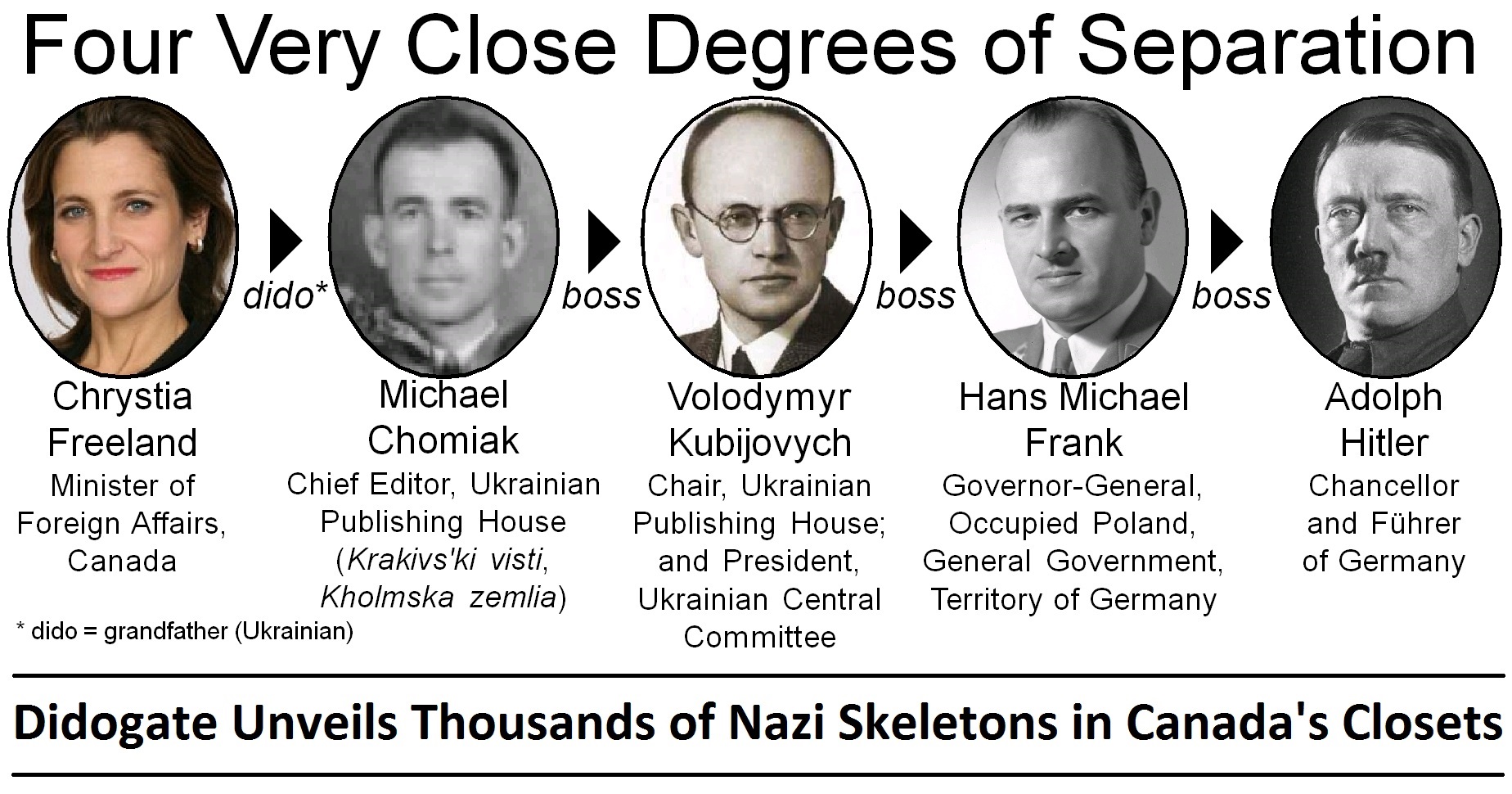
Minister Freeland's Grandfather,
Fake News,
|
|
|
By Richard Sanders, editor, Press for Conversion! magazine of the Coalition to Oppose the Arms Trade, March 22, 2017 "It takes a village to raise a Nazi" (old African proverb, slightly modified) |
|
|
1- Introduction 2 - The Liberal Government's Warm Embrace of Ukraine's Nazi Collaborators 3 - Historical Amnesia and the Blinding Effects of Propaganda 4 - The Nazis as Victims? Sure, just Blame the Russians! 5 - Canada needs Truth and Reconciliation, not Denials and Obfuscation 6 - Historical Denial among Canada's ultranationalist Ukrainians 7 - Michael Chomiak, The Ukrainian Central Committee and its Nazi Newspapers 8 - Aryanisation and the "Mighty Wurlitzer" 9 - The Ukrainian Canadian Congress and its Fascist Roots 10 - Getting them Early: Building the ultraNationalist Cause among Children and Youth 11 - The Freeland-Chomiak Parallels in Advocacy Journalism 12 - Was Freeland an "Accidental Journalist," or Groomed for the Job? 13 - In 1989, Freeland was Declared an "Enemy of the Soviet State" 14 - A Chomiak-Freeland Fixation on Jewish Oligarchs running the Kremlin 15 - Freeland's Kremlin-Oligarch Theory goes Global with Jewish Plutarchetype 16 - Institutionalised Confidence Scams: An Open Conspiracy of Oligarchs, Politicians and Journalists 17 - Escaping the War Racket starts with Seeing the Elephant 18 - Just Following Orders? Which Orders? 19 - Is there a Bear in the Room? Kill it! 20 - The Collective Care and Feeding of Russophobia 21 - The Need for Truth and Reconciliation
If you appreciate the work that went into this research, please
subscribe &/or donate.
You can mail this
coupon
to COAT, or use the
Paypal link
on our homepage. Subscription prices:
Captive
Canada: This issue (#68) deals with the mass internment of Ukrainian Canadians, this community's left-right split and the mainstream racist, xenophobic anti-communism of progressive "Social Gospellers" (like the CCF's J.S. Woodsworth) who were so captivated by their false beliefs that they carried out the genocide of First Nations and turned a blind eye to government repression during the 20th-century "Red Scare." The main thesis of my theory: |
Part 2 Chrystia Freeland's grandfather is something of a diversion. The broader truth that must come out of the Canadian closet is that in the years immediately following WWII, tens of thousands of "displaced persons" of Ukrainian heritage were brought into this country by Canada's notoriously antiSemitic Liberal government. Many thousands of these immigrants harboured such extremely nationalistic ideologies towards Ukraine that they had sympathised and collaborated with the Nazi regime during the war. Many were pleased to do this because they had been led to believe ‑ by their mass media, the church and other powerful civic institutions ‑ that the Third Reich was a benevolent, liberating force which was assisting them in the noble cause of promoting Ukrainian culture. They also felt a strong affinity to the Nazis because they shared a common worldview which despised two mortal enemies: Jews and communists. This worldview ‑ regarding a Judeo-Bolshevik enemy ‑ was also shared by many mainstream Canadians at that time, including many among this country's top political and religious leaders.
The Liberal government's efforts to bring thousands of Ukrainian nationalist war veterans into the Canadian fold was passionately opposed by the AUUC and the Canadian Jewish Congress (CJC).[ii] The AUUC and the CJC both represented cultural communities that had been severely repressed by successive Anglo-Protestant Canadian governments. While the Jewish community suffered bigotry and segregation based merely on religious/ethnic discrimination, the AUUC was punished for its politics. Red Scares had twice made the AUUC illegal and all of its newspapers and other publications were banned. Tons of books from AUUC libraries were literally burned, its leaders arrested, and its printing presses and Labour Temples (meeting halls) were seized and in some cases even turned over to ultranationalists associated with Ukrainian Canadian Congress.[iii] Canada's decidedly antiSemitic and anticommunist state has gone through phases of extreme social paranoia which exhibited zero tolerance for either Judaism or communism. These -isms were seen as totally contradictory to Canada's "Christian values."
But within the sheltered world of the newly-arrived, ultranationalist Ukrainian-Canadian village, the Government of Canada has always been seen as a benevolent force that has guarded and encouraged their particular political, religious and ethnic rights. After leaving the generous and nurturing protection of the Nazi regime, which provided him with shelter and employment during the war, Michael Chomiak again felt welcomed after the war when Canada's beneficent Liberal government welcomed him to his new land. And, let's not forget another parallel. In both cases, the governments which welcomed Chomiak and his community, had taken political possession of the territory through occupation and colonisation, using processes that included xenophobic and racist propaganda, ethnic cleansing and, yes, genocide.
Here is how Chrystia Freeland has described
her Ukrainian grandfather's unquestioningly vociferous devotion to his newly
adopted country: While this
still-popular view of Canadian global supremacy is not shared by Indigenous
populations and others, many Ukrainian Canadians ‑ whose parents and
grandparents emigrated here soon after WWII ‑ feel an understandable debt of
gratitude towards the Canadian state. The Liberal government and succeeding
Conservative ones did, after all, institute a multicultural model which
actively encouraged Ukrainians to proudly promote their culture with all of
its strongly focused belief systems. Chrystia Freeland is not alone in
retaining a corresponding sense of great pride and respect for her Ukrainian
forebears who after coming to Canada, passed along to their offspring an
undying support for the cause of patriotic Ukrainian national building. |
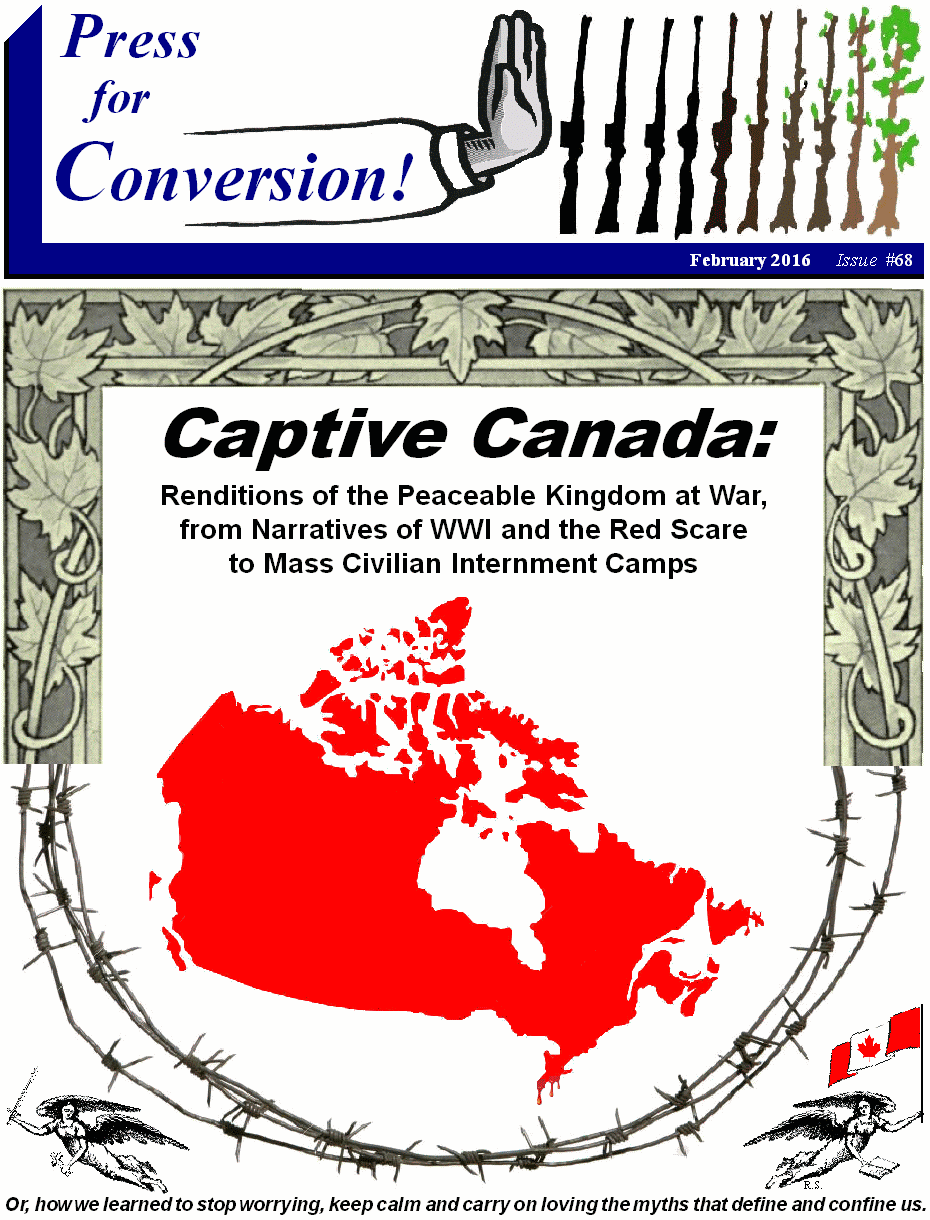
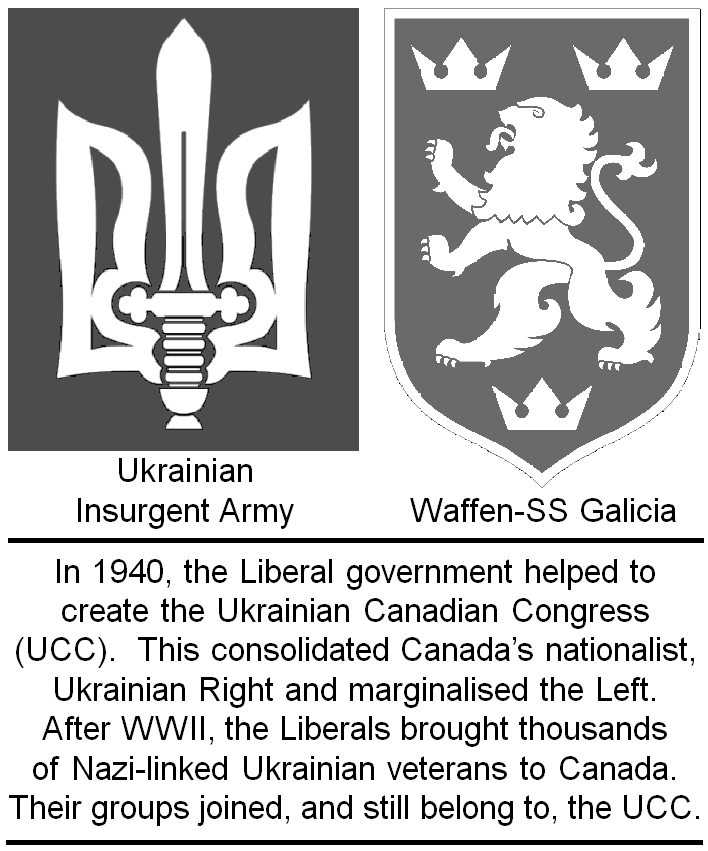 The new Ukrainian Canadians who emigrated
here after WWII included several thousand veterans from two military
formations within the Nazi military's embrace: the Waffen SS Galicia and
the Ukrainian Insurgent Army (known by its Ukrainian acronym, UPA). The
latter was the militarized wing of that faction of the Organisation of
Ukrainian Nationalists, the OUN(B), that was led by an infamous Ukrainian
fascist named Stepan Bandera. Many Canadian offspring of this "Third Wave"
of Ukrainian immigrants still continue to perpetuate a hero-cult reverence
towards the memory of these WWII veterans, their political and military
leaders, and the extremely rightwing, nationalist ideologies that they
epitomise. For example, the Ukrainian Canadian Congress, and its
longstanding president Paul Grod, who Chrystia Freeland counts among her
friends, has long had numerous core national member organisations that
represent the leadership of both factions within the OUN, including the more
extreme Banderites. Congress membership has also included the key
associations representing the UPA, the Waffen SS Galicia, and a Bandera
youth organisation, the Ukrainian Youth Association, which ‑ like scouting
outfits across the British empire ‑ is structured along military lines.
The new Ukrainian Canadians who emigrated
here after WWII included several thousand veterans from two military
formations within the Nazi military's embrace: the Waffen SS Galicia and
the Ukrainian Insurgent Army (known by its Ukrainian acronym, UPA). The
latter was the militarized wing of that faction of the Organisation of
Ukrainian Nationalists, the OUN(B), that was led by an infamous Ukrainian
fascist named Stepan Bandera. Many Canadian offspring of this "Third Wave"
of Ukrainian immigrants still continue to perpetuate a hero-cult reverence
towards the memory of these WWII veterans, their political and military
leaders, and the extremely rightwing, nationalist ideologies that they
epitomise. For example, the Ukrainian Canadian Congress, and its
longstanding president Paul Grod, who Chrystia Freeland counts among her
friends, has long had numerous core national member organisations that
represent the leadership of both factions within the OUN, including the more
extreme Banderites. Congress membership has also included the key
associations representing the UPA, the Waffen SS Galicia, and a Bandera
youth organisation, the Ukrainian Youth Association, which ‑ like scouting
outfits across the British empire ‑ is structured along military lines.
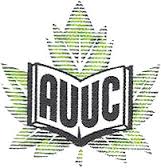 When the Liberal government orchestrated
this largescale, postwar influx of Ukrainian émigrés, some Canadians were
overjoyed to welcome them. Others however felt betrayed, again. The
organisation which most vociferously supported the Mackenzie King
government's move to allow former Nazi sympathisers, supporters and
collaborators into Canada was the Ukrainian Canadian Congress. This
organisation had been established by the Liberal government in 1940 in order
to consolidate all anticommunist Ukrainians under one roof. Their rival
organisation in Canada was the Association of United Ukrainian Canadians (AUUC), a progressive organisation which includes social democrats,
socialists and communists. Before the Liberals manufactured the Congress
and brought in tens of thousands of Ukrainians after the war, the AUUC had
been
the most powerful voice within Canada's Ukrainian émigré community.
When the Liberal government orchestrated
this largescale, postwar influx of Ukrainian émigrés, some Canadians were
overjoyed to welcome them. Others however felt betrayed, again. The
organisation which most vociferously supported the Mackenzie King
government's move to allow former Nazi sympathisers, supporters and
collaborators into Canada was the Ukrainian Canadian Congress. This
organisation had been established by the Liberal government in 1940 in order
to consolidate all anticommunist Ukrainians under one roof. Their rival
organisation in Canada was the Association of United Ukrainian Canadians (AUUC), a progressive organisation which includes social democrats,
socialists and communists. Before the Liberals manufactured the Congress
and brought in tens of thousands of Ukrainians after the war, the AUUC had
been
the most powerful voice within Canada's Ukrainian émigré community.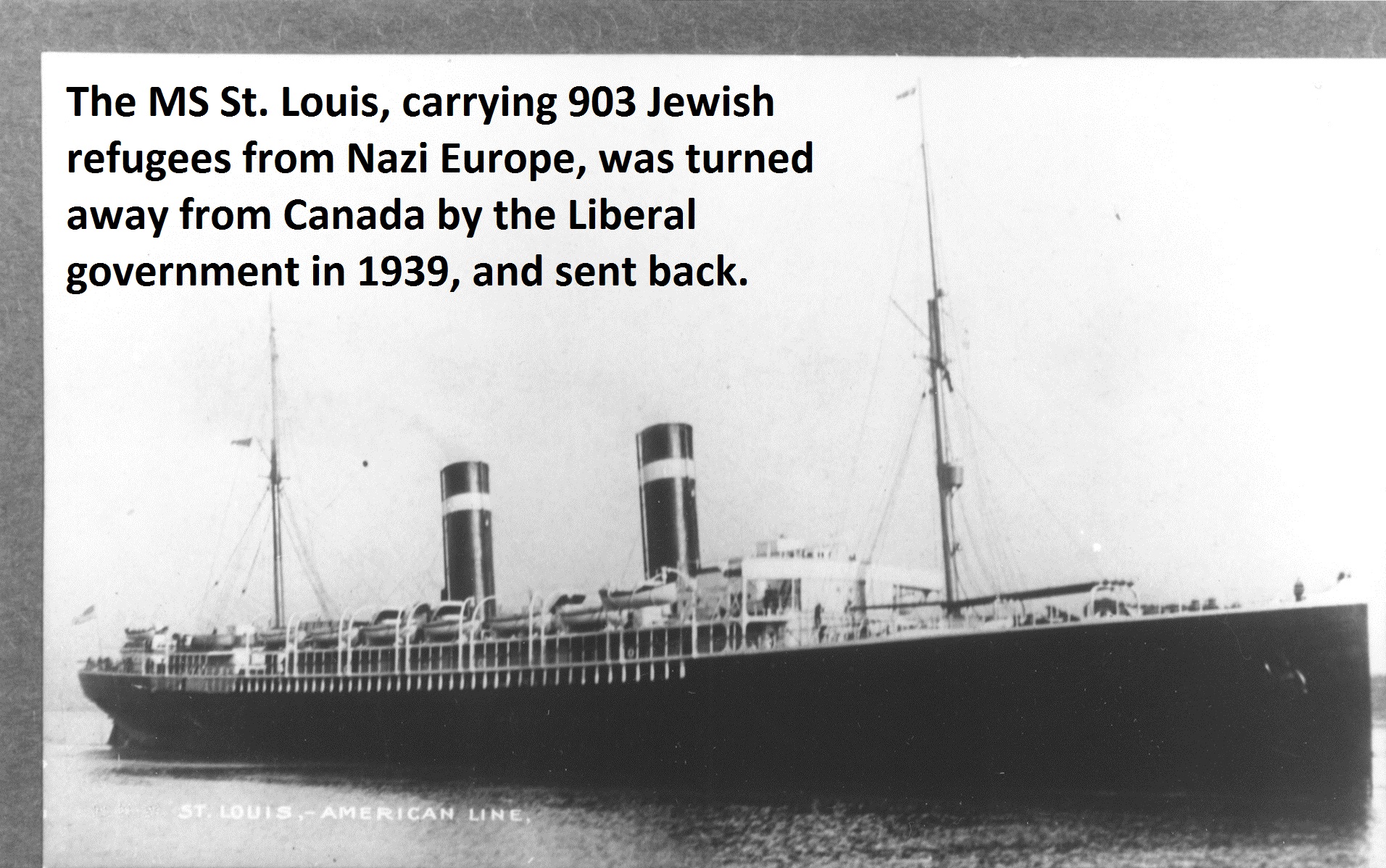 Despite this history of repression, the
Liberal government has a reputation for embracing diversity and
multiculturalism. This image stands in stark contrast to its notoriously
antiSemitic immigration policies before and during WWII. Just before the
war, Mackenzie King's Liberal government actually used the Canadian Navy to
turn away a passenger ship carrying about 1000 Jewish refugees. These
unwanted souls were pushed away from the safety of Canadian harbours and
sent back to Europe where most met their deaths in the Holocaust. When it
came to Jews, Canada's immigration policy was that "none is too many."
Despite this history of repression, the
Liberal government has a reputation for embracing diversity and
multiculturalism. This image stands in stark contrast to its notoriously
antiSemitic immigration policies before and during WWII. Just before the
war, Mackenzie King's Liberal government actually used the Canadian Navy to
turn away a passenger ship carrying about 1000 Jewish refugees. These
unwanted souls were pushed away from the safety of Canadian harbours and
sent back to Europe where most met their deaths in the Holocaust. When it
came to Jews, Canada's immigration policy was that "none is too many."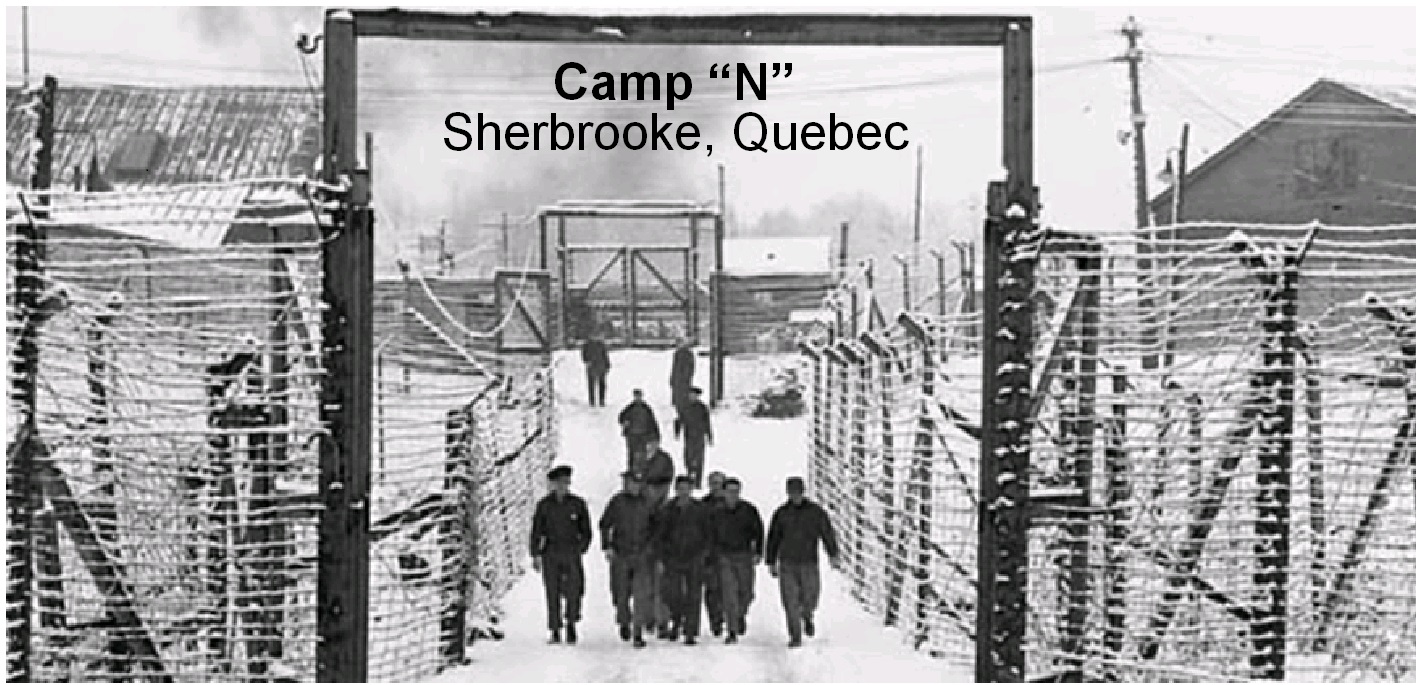 Then, during WWII, when Britain sent tens
of thousands of its POWs to Canada, the Liberals found ‑ to their horror ‑
that there were thousands of Jewish and Communist refugees among these
prisoners. The Liberal government was outraged. They managed to send about
half of these unwanted refugees back to Britain but were forced to keep some
2,000 Jews and 300 communists. The Government of Canada promptly interned
these refugees in POW camps in four provinces, including Camp "N," where they were surrounded by
barbed wire, guard towers and armed Canadian soldiers, for much of WWII.
Then, during WWII, when Britain sent tens
of thousands of its POWs to Canada, the Liberals found ‑ to their horror ‑
that there were thousands of Jewish and Communist refugees among these
prisoners. The Liberal government was outraged. They managed to send about
half of these unwanted refugees back to Britain but were forced to keep some
2,000 Jews and 300 communists. The Government of Canada promptly interned
these refugees in POW camps in four provinces, including Camp "N," where they were surrounded by
barbed wire, guard towers and armed Canadian soldiers, for much of WWII.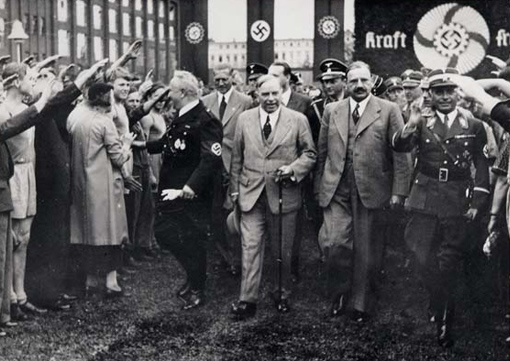 And, lest we forget, MacKenzie King wrote
glowingly in his diaries about the various friendly personal meetings that
he had in Europe
And, lest we forget, MacKenzie King wrote
glowingly in his diaries about the various friendly personal meetings that
he had in Europe